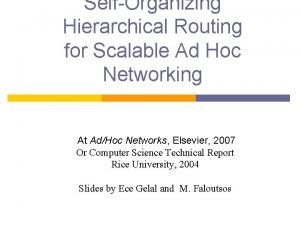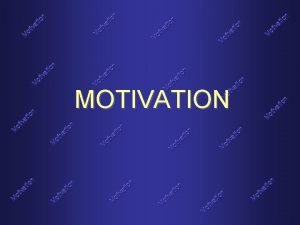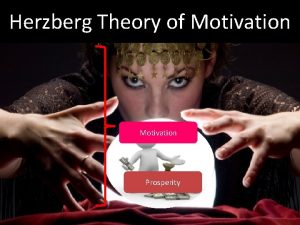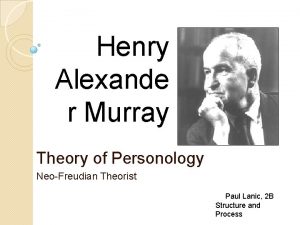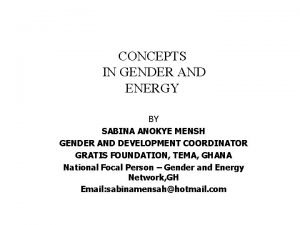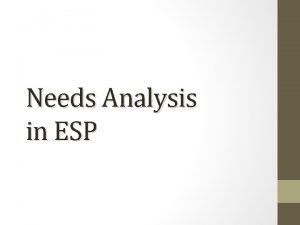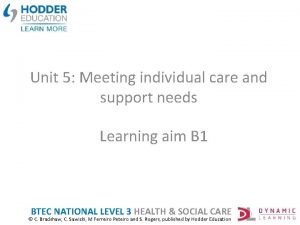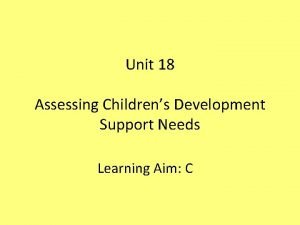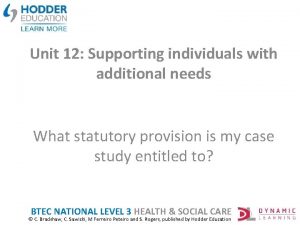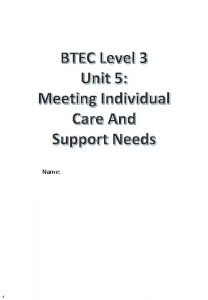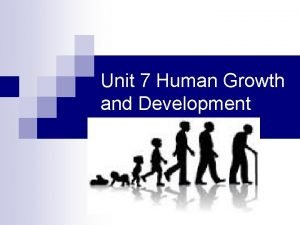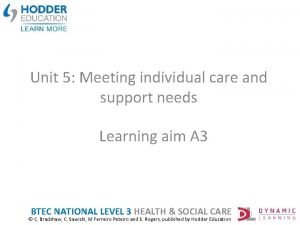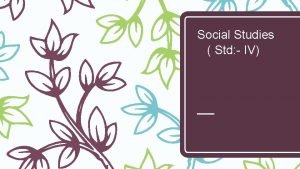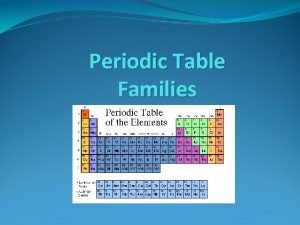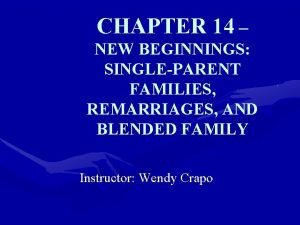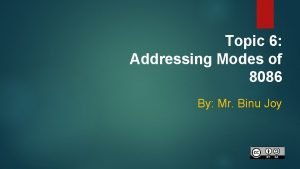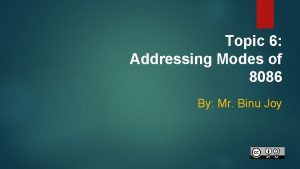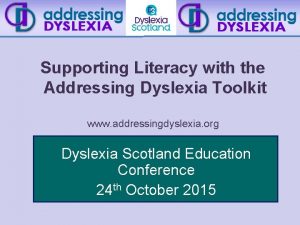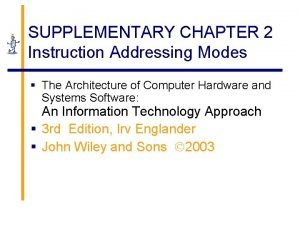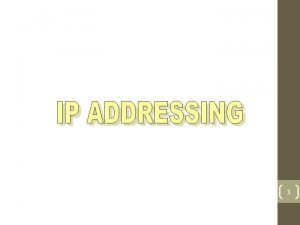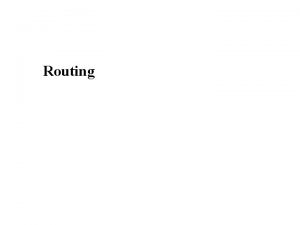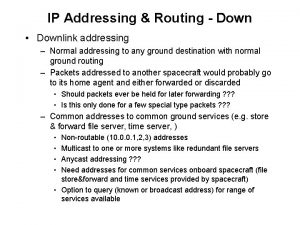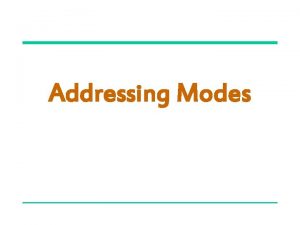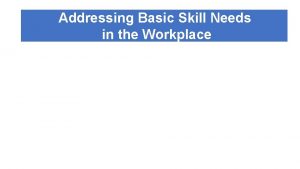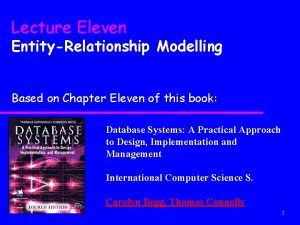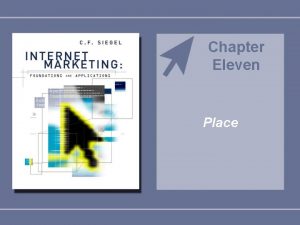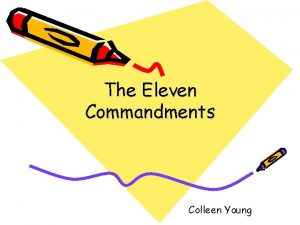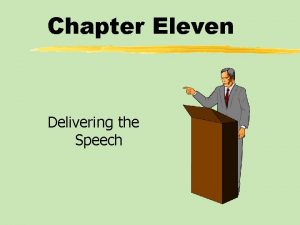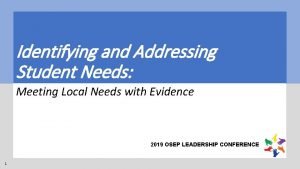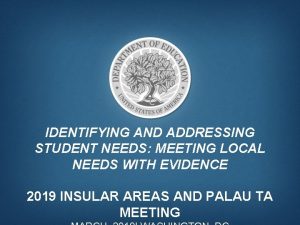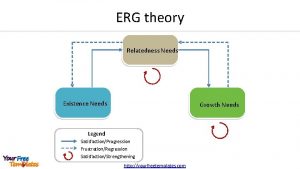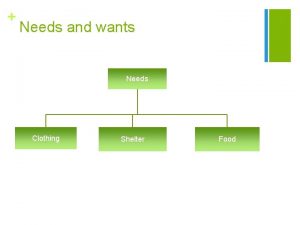UNIT ELEVEN ADDRESSING THE NEEDS OF THE FAMILY




















- Slides: 20

• UNIT ELEVEN • ADDRESSING THE NEEDS OF THE • FAMILY


• Introduction • Many different definitions exist, but most family theorists agree that a family consists of one or more individuals who share a residence or live near one another, possess some common emotional bond and engage in interrelated social positions, roles and tasks.


• Universal Characteristics of Families • Every family shares some universal characteristics with every other family. These universal characteristics provide an important key to understanding each family’s uniqueness. • Five universal family characteristics are:

• Every family is a small – social system • a) A families are interdependent; each member’s actions affect others members • b) Families maintain boundaries; • family closeness • links family members together in bond • greater concentration with in the family • c) Family exchange energy: • exchange materials, information • need, take, health care, education, employment…. . • Contribute to the community by working, consuming goods services….

• Families are adaptive behavior: • equilibrium seeking behavior • shift and change in response to internal and external forces. • Some times, if the internal /external forces (stress) beyond its limit, the family members • leave and become dysfunctional, at this time the family need help / interventions to restore equilibrium.


• • • Families are goal directed: exist for purpose, for example to establish and promote the development of their members, to provide love security, assistance etc… to their family members. Every family has its own cultural values and rules. Shared values and effects Certain roles are presented and defined for family members Every family has structures Traditional family: Nuclear family (husband, wife, and children Live in common house) Nuclear –dyad (husband, wife, with no children or grow children out side home single parent (one adult male/female living alone multigenerational (several age group live together. E. g. , widowed women live with divorceddaughter with grand children’s)

• Non traditional family structure • ex-Un married single parent (single women live with children • - co-habituating couple (two adults, just friends group marriage (several adults who share common household and consider that all are married, share every thing including sex, child rearing etc. ) • 4. Every family has certain basic function • a) affection • – give love and emotional support to the members • sharing of gifts during holiday • -love for sick family members

• • • • provide security and acceptance meet there members physical need (food, shelter, clothing acceptance of individual members c) affiliation & companionship development of communication pattern Establishment of durable bond not broken by distance, time… ex. gathering during holiday, weeding …even when scattered. d) socialization Internalization of value Guidance for internal and external relation ship e) control – maintenance of social control (ex. appropriate dressing division of labor allocate various tasks, responsibilities …. .


• Every family moves through stages in its life cycle two broad stages • - period of expanding Æwhen the family add new member/roles • - period of contracting Æwhen members leave or dead. • Characteristics of healthy families • Healthy interaction among members • - Discuss problems • - Confront each other • - Share ideas and concern …. etc

• • • Enhancement of individual development Promote each members growth Effective structuring of relation ship Structure their role relationship to meet changing family needs over time. (flexibility of role) Active coping effort Actively attempt to over come life’s problems and issues Healthy environment and life-style -create safe and hygienic living conditions for their members.


• Regular links with the broader community • - Maintain dynamic ties the broader community • - Participate regularly in external groups and activities

• Application of nursing process on promoting FH Family health Assessment- provides information’s on the measuring a current health situation of family member and emotional support that can be expected to be offered to an individual from the family. • Main areas of assessment includes: • Family demography (age, sex, education, occupation, etc…. ) • Physical environment (housing space, climate, dietary pattern…) • Psychological and spiritual environment (mutual respect, support, • Family structure and role (division of labor, socialization process allocation and use of power…) • Family function (ability to carry out appropriate developmental tasks…. • Family value and belief

• . Family communication pattern (frequency and quality of communication with in the family, b/n the family and its environment) • • Family decision making pattern (how, by whom, when decision is made) • • Family problem solving pattern (how a family handles its problem • • Family coping pattern (how a family handles conflicts and life change, family perception and response to stressors) • • Family health behavior (family health history, current health status, health belief, use of health resource. . . )

• • • Family Nursing Diagnosis- example: Potential for enhanced parenting Potential for role conflict related to prolonged separation Altered family process related to emergency hospital admission of chilled Altered family process related to unplanned pregnancy. Planning – depend on the type of diagnosis established and the goal to be achieved -must be appropriate and desired by family members. Implementation- A plan can be easily implemented if a family members have agreed on it and support one another. Evaluation - include not only the goals was achieved, but also that the family feels more cohesive after working together toward the goal.

 Flat addressing vs hierarchical addressing
Flat addressing vs hierarchical addressing Primary needs and secondary needs
Primary needs and secondary needs Satisfaction
Satisfaction Alpha press murray
Alpha press murray Strategic gender needs and practical gender needs
Strategic gender needs and practical gender needs Present situation analysis
Present situation analysis Purpose of home visiting in community health nursing
Purpose of home visiting in community health nursing Unit 10, unit 10 review tests, unit 10 general test
Unit 10, unit 10 review tests, unit 10 general test Unit 5 meeting individual needs
Unit 5 meeting individual needs Unit 18 assessing children's development support needs
Unit 18 assessing children's development support needs Supporting individuals with additional needs
Supporting individuals with additional needs Unit 5 health and social care assignment
Unit 5 health and social care assignment Unit 7:1 life stages
Unit 7:1 life stages Unit 5 meeting individual care and support needs
Unit 5 meeting individual care and support needs Conjugal family
Conjugal family Carbon family
Carbon family Binuclear family vs blended family
Binuclear family vs blended family Indirect addressing mode example 8086
Indirect addressing mode example 8086 Addressing modes of 8086 microprocessor
Addressing modes of 8086 microprocessor Addressing dyslexia toolkit
Addressing dyslexia toolkit Addressing mode in computer architecture
Addressing mode in computer architecture
